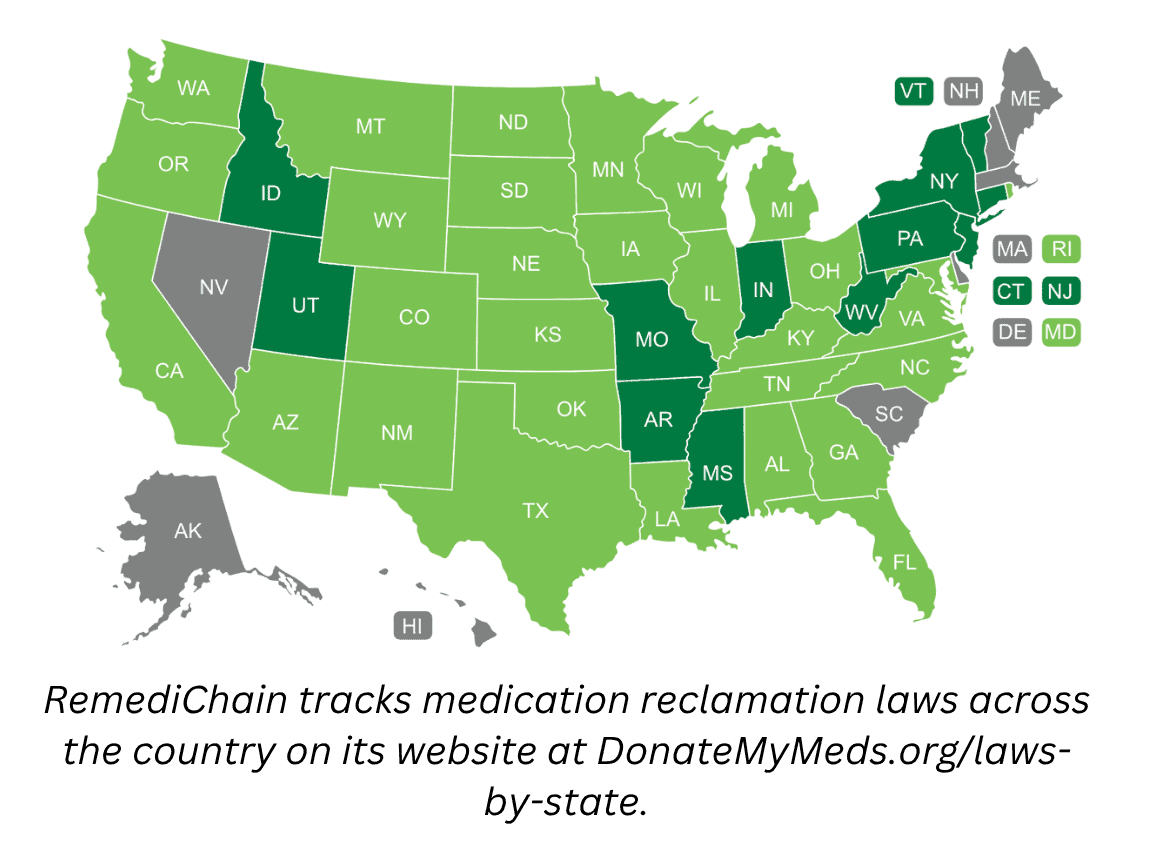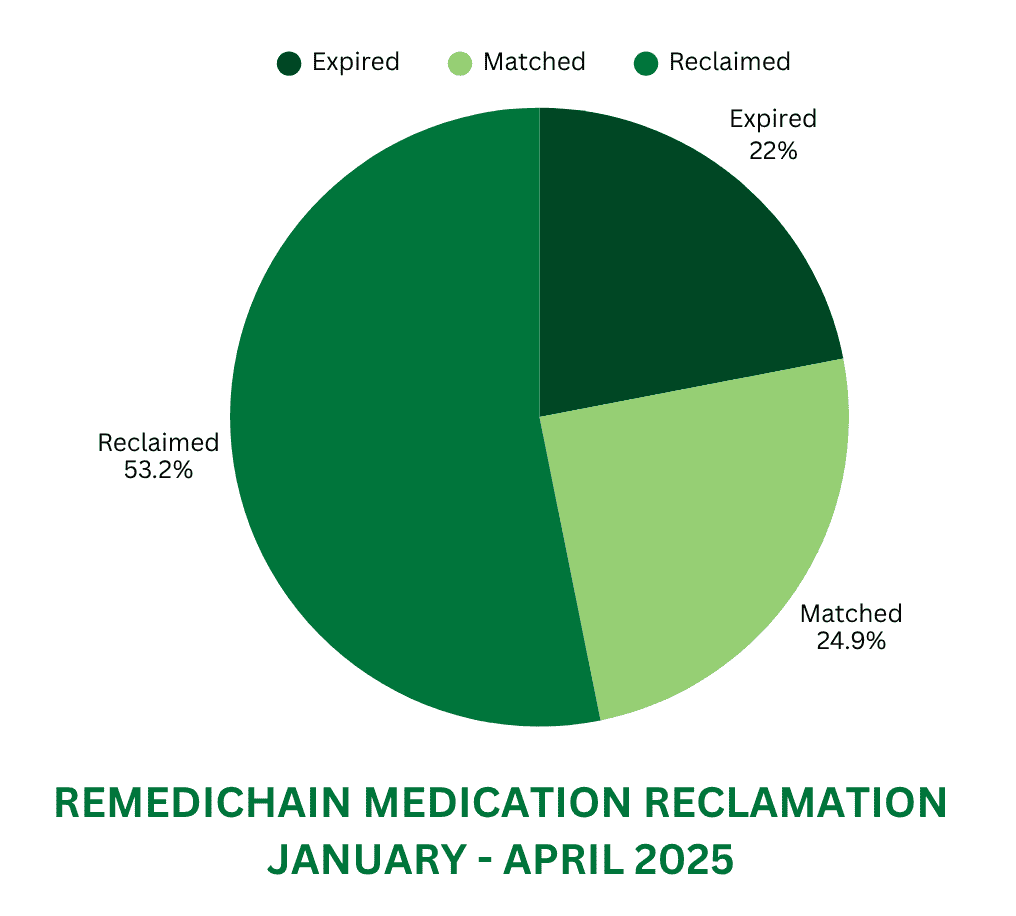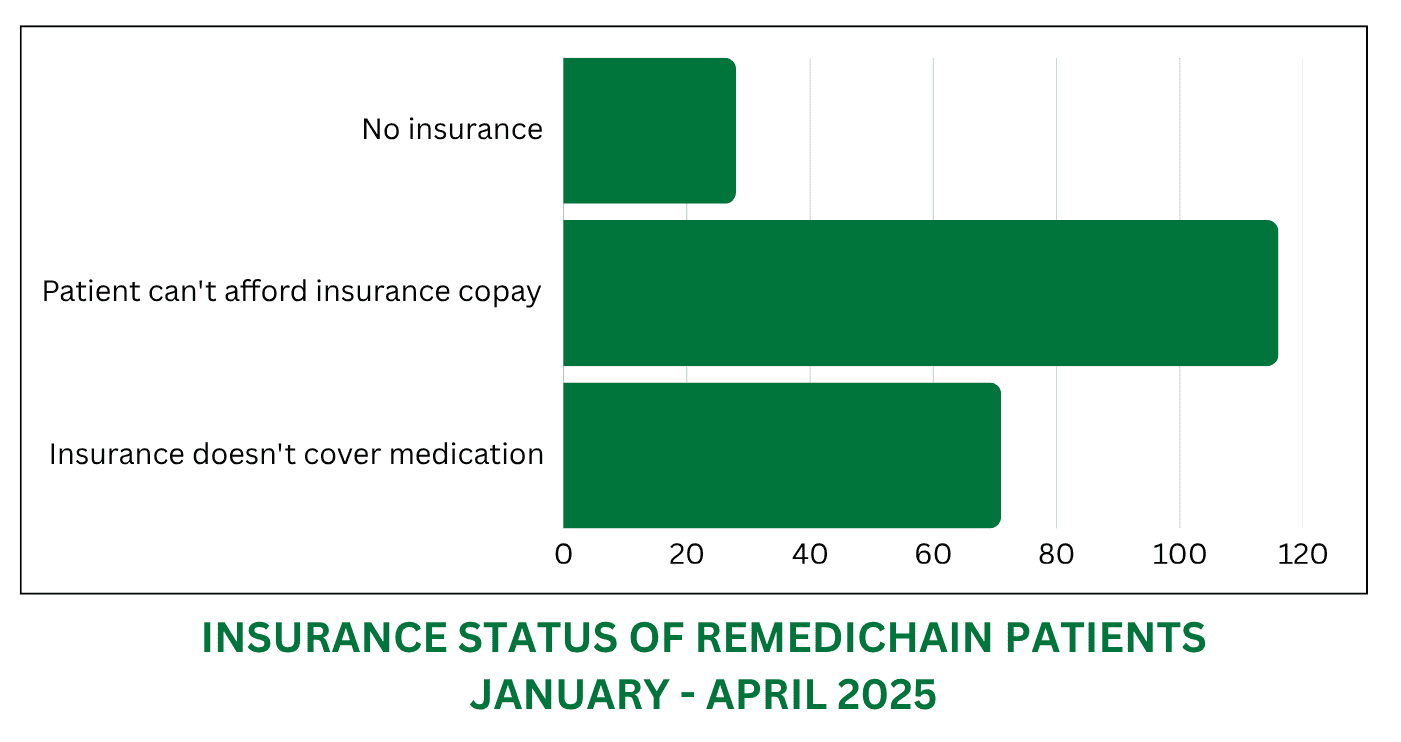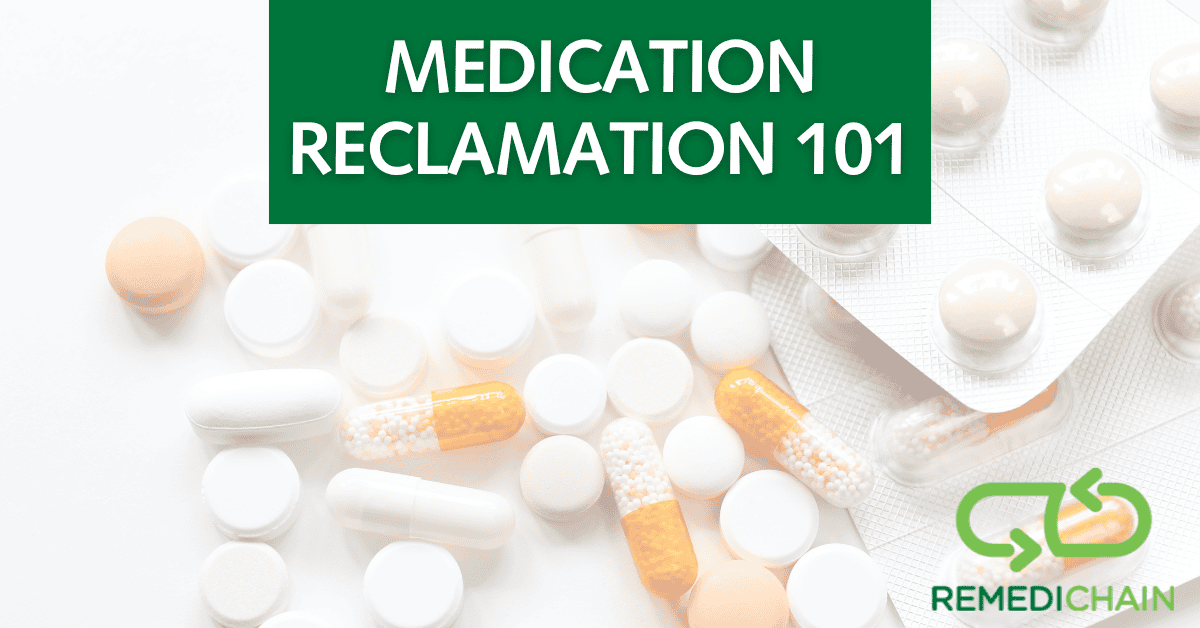Why medication reclamation? Nationwide, more than $11 billion worth of medication is destroyed each year, and 20% of filled prescriptions end up being thrown away. This happens while 32 million Americans report that they can’t afford their medication. According to the Environmental Protection Agency, about 740 tons of drugs are wasted just by nursing homes each year. This is an especially prominent problem for cancer patients, as oral chemotherapy drugs can cost up to $45,000 for a 30-day supply.
Throwing away perfectly good medicine feels doubly wasteful. It’s bad for the environment and it could have been used to help a fellow person in need, so we found a remedy. But you can donate your unused medication to RemediChain.
If you’re scratching your head wondering how such a thing could possibly be safely, legally donated, the experts at RemediChain have it all figured out. Tennessee law allows us to accept donations of many types of unopened, unexpired, good condition medication at our Memphis-based facility. Our pharmacists inspect and certify every donation so it can be safely redistributed to patients who need it, and we’re well-versed on the varying state-level laws governing this effort. Our COO, Michell Zulu, sat down for a Q&A with The Med List to share the basics of medication reclamation. Click here to listen to the full episode, or read on for details.
Why RemediChain?
As Michell said, “there comes a time in your life when you realize that your passions are no longer being fulfilled. In pharmacy school, we learn that saving lives happens one patient at a time. And we see that life-saving impact at RemediChain.”
As a nonprofit, RemediChain exists solely to help people. This program uses medication reclamation to improve access to necessary medication for people who might otherwise just go without. And it’s personal for Michell. She lost her aunt, her dad’s youngest sister. Michell believes that if she’d been able to access her medication, her aunt may still be alive.
The Legality
Donation for medication reclamation is 100% legal – RemediChain actually championed a law to make it so. In the state of Tennessee, where RemediChain is located, the organization can accept medication donations from anywhere in the United States. Donations have to meet certain criteria. For example, RemediChain cannot accept medications that require refrigeration or other temperature controls, because there is no way to certify that they were properly stored before being donated. Liquids can be a challenge, but RemediChain does accept them if they’re unopened, in the manufacturer’s original packaging, and with the expiration date clearly visible.
The dispensing part of medication reclamation is a little trickier, as it varies depending on the patient’s resident state laws. Currently, RemediChain is licensed in 30 states across the country. But each state has different criteria. In most states, a recipient must fall below a certain income level or not have insurance. But typically, as long as RemediChain can justify that no one else was waiting for that drug and it was an ultimate need for a patient, most states are OK with those who may not specifically meet their established requirements.
Also worth noting, RemediChain does not dispense medications directly to patients. Generally, a provider receives them, then passes them along to the patient as a sample.

The Donation Portion of Medication Reclamation
Initiation
Most medication reclamation donations start by filling out a form at DonateMyMeds.org to let RemediChain know what they have. If the organization can accept it, donors receive a prepaid shipping label via email, allowing them to send the medications at no cost to them.
Arrival and Inspection
Once the medication arrives at RemediChain, a licensed pharmacist inspects it to ensure it’s unopened and has not been tampered with. Once it meets the organization’s rigorous safety criteria, it’s put into inventory.
Inventory
Currently, RemediChain has a digital platform that is regularly updated and upgraded. Long-term, the goal is to have a continuously updated inventory people can look through – not unlike grocery shopping – to see what medications are available. Until then, any patient, caregiver, provider, navigator or other supporter can fill out the request form at DonateMyMeds.org. Someone from RemediChain typically responds within 24 hours to advise of medication availability.
Although RemediChain doesn’t always have all medications, the organization is able to meet patients’ needs about half the time – and those odds are pretty great!
The Legal-Financial-Logistical-Technological Puzzle
RemediChain pulls together countless disparate pieces to make this process work. Years ago, the staff simply maintained spreadsheets to manage medication inventory – a process that required significant patience and dedication.
That evolved when founder Phil Baker worked to get the medication reclamation law passed. The forward-thinking people at RemediChain recognized the problem, including the red tape – so they changed it.
Initially, RemediChain collected medications for about a year and a half prior to going “live” with its inventory. The goal was to get a picture of what the waste looked like, ensuring there were a variety of drugs available for reclamation to meet the needs of as many patients as possible. The full initiative went live in early 2020, with the first patient matches taking place that year – an interesting time for many reasons!
The Matching Process
Finding patients
Since the program’s launch, it has become obvious that the need for medication reclamation exists. Still, spreading the word is a challenge all its own. RemediChain relies heavily on word of mouth and targeted outreach to groups with both reclaimable medication and patients who need the existing inventory. And anyone can share information about RemediChain.
Most patients in need (or their representatives) submit a request form at DonateMyMeds.org. But when a single clinic or point of contact has many patients and needs multiple medications, RemediChain may meet with them to streamline the process for sending many medications at once.
Varying Inventory
Although not necessarily by design, most of RemediChain’s reclaimed medication is oral chemotherapy. But plenty of in-demand high-value drugs come through. For example, many patients are in need of Eliquis, a medication that is very effective for people at risk of strokes or blood clots.
The challenge is that RemediChain relies solely on donations, so sometimes what a patient needs is not available. Other times, many patients need the same thing, and there isn’t always enough to go around. Eliquis is a good example of that – as soon as it comes in, it goes right back out.
Short-Term Availability
When matching patients with donated medications, it’s important to note that the medication reclamation program fills a gap, but it is not always a reliable month-to-month option. Patients, providers and caregivers should always consider what’s next. Will the patient pursue a manufacturer assistance program, consider alternative therapy, or receive a prior authorization from an insurance company?
Occasionally, RemediChain does have enough of certain medications to meet a patient’s needs for a relatively short term. More high-demand, low-supply medications are offered on a first-come, first-served basis. As long as the medication is in inventory, it is given to current patients.
Types of Medication Donations and Donors
Medication Reclamation Restrictions
RemediChain, per Tennessee law, does have some discretion regarding what types of medications it can accept. The organization sets parameters based on factors like whether a certain type of drug can be safely donated and shared. For example, the law allows for reclaiming injectables, but RemediChain is very selective with them due to safety concerns, typically only accepting injectables like Lovenox that are individually packaged.
Patient Donors
Typically, individual patients have medication to donate for one of a few reasons, many related to changing therapies. Patients who receive multi-month fills from mail-order pharmacies may find themselves with extra if they had to stop a medication due to side effects or if their prescription changed and the shipments kept coming. Occasionally, patients who have not adhered to their prescribed regimens may also wind up with unopened medications.
Facility Donors
Many facilities, like hospitals or cancer centers, send donations after their patients ask what can be done with unused medications. Those extras exist for the same reasons an individual sends them to us – a change in therapies or other similar circumstances.
It does get tricky with health care systems, which frequently must destroy tens of thousands of dollars worth of expired medication. If a large hospital has that much waste, they want to be able to account for it and maybe get a credit. For those reasons, a lot of excess unused inventory from organizations like that just gets destroyed. It’s a problem we’re working through.
Although RemediChain does not currently receive significant numbers of donations from pharmacies, the opportunity exists to save drugs that may go to waste due to looming expiration dates. This type of medication reclamation partnership could result in savings for the pharmacies – who could use the retail value of donated medications as a tax deduction – as well as result in the medication going to patients in need (instead of to a landfill).
Surprising Medication Reclamation Stats
Dollar Value
It’s no secret that prescription costs are high. This is especially true for many of the most necessary specialty medications. The graphic to the right represents just the first four months of 2025, during which RemediChain reclaimed more than $5 million worth of unused medications, sharing nearly $2.5 million worth with patients who might have otherwise gone without. Since its inception, RemediChain has reclaimed more than $65 million worth of unused prescription medications.
Insurance Status
It’s easy to assume that “patients in need” refers to people without insurance. But that is not the case. In fact, among patients who received medication from RemediChain in the first four months of 2025, the majority – 87% – did have insurance. But they came to RemediChain because they could not afford their co-pays, or because their plans would not cover the medication they needed.

Every Patient Has A Story
Not all patients in need are considered marginalized, but they need help just the same. One patient reached out after finding RemediChain in a Facebook group. She’d had a good life. She had insurance, but of course she didn’t get diagnosed with cancer until after she retired from her career as a flight attendant. Her co-pay would have put her into financial toxicity within months.
RemediChain has a relatively large supply of some drugs. And this patient happened to need one of them. She received medication every month until her therapies changed to a more cost-efficient option. And the staff at RemediChain still checks in on her periodically.
This story is a good example of the problems RemediChain aims to address with its medication reclamation program. It doesn’t matter how well-off someone appears to be. Medical debt is a leading cause of bankruptcy in the United States, and cancer debt is particularly massive. RemediChain is a blessing for these patients.
The Key Points
If you’re a patient and you get prescribed something that is too costly, go to DonateMyMeds.org, click on the “Need Meds” button and fill out the form. Someone will contact you within 24 hours to discuss whether we may be able to help. If RemediChain can’t meet your needs, the staff will try to point you in the right direction. As a whole, it’s also important to understand your insurance coverage. Know your co-pays and deductibles and let your provider know if you have a problem accessing your prescriptions.
If you’re a provider, start by talking to your patients about the cost of the medications you’re prescribing. People don’t often think about that in the context of providing care, but if the patient can’t afford the medication, it won’t help them. Find out what barriers exist for patients to access the medication they need. You’ll probably quickly identify those who are a perfect fit for RemediChain.

